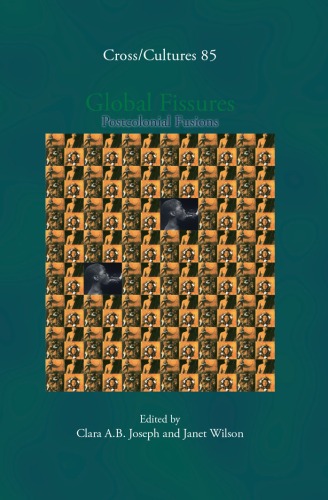

Most ebook files are in PDF format, so you can easily read them using various software such as Foxit Reader or directly on the Google Chrome browser.
Some ebook files are released by publishers in other formats such as .awz, .mobi, .epub, .fb2, etc. You may need to install specific software to read these formats on mobile/PC, such as Calibre.
Please read the tutorial at this link: https://ebookbell.com/faq
We offer FREE conversion to the popular formats you request; however, this may take some time. Therefore, right after payment, please email us, and we will try to provide the service as quickly as possible.
For some exceptional file formats or broken links (if any), please refrain from opening any disputes. Instead, email us first, and we will try to assist within a maximum of 6 hours.
EbookBell Team

4.4
62 reviews
ISBN 10: 9042020180
ISBN 13: 9789042020184
Author: Clara A B Joseph
The essays in this volume examine the tensions between two major political and intellectual structures: the global and the postcolonial, charting the ways in which such tensions are constitutive of changing power relations between the individual, the nation-state and global forces. Contributors ask how postcolonialism, with its emphasis on cultural difference and diversity, can respond to the new, neo-imperialist imperatives of globalization. Signalling the discursive grounds for debate is the fissures/fusions title, suggesting alternative categorizations of stereotypes like ‘global homogenization’ and ‘postcolonial resistance’. Interwoven are considerations of the intellectual or writer’s position today.
Literary texts from a wide range of countries are analysed for their resistance to global hegemony and for representations of manipulative power structures, in order to highlight issues such as environmental loss, nationality, migrancy, and marginality. Specific topics covered include ‘westernizing’ the Indian academy, ecotourism and the new media of computer technology, the corporatization of creativity in ‘re-branding’ New Zealand (including film), and the hybrid forms of Latin American photography. Writers discussed include Chinua Achebe, Samuel Beckett, Hafid Bouazza, Bei Dao, Mahmoud Darwish, Witi Ihimaera, James Joyce, Yann Martel, Rohinton Mistry, Ellen Ombre, Michael Ondaatje, George Orwell, Arundhati Roy, Salman Rushdie, and Edward Said. Different essays stress the hegemony of global networks; the technological revolution’s revitalizing of niche marketing while marginalizing postcolonial resistance; the implications of the internationalization of culture for the indigene; and the potential of cultural hybridity to collapse cultural hierarchies.
Section 1: Theorizing the Global and the Postcolonial
Theorizing the Diaspora
This chapter likely explores theoretical frameworks of diaspora in the context of globalization, examining how migration and transnationalism challenge traditional notions of identity and belonging.
The Price of Silence: Intellectual Communication in the Age of Globalization
This essay probably considers the role and challenges of intellectuals and writers in a globalized world, particularly concerning issues of communication, subalternity, and power dynamics.
Is the World Decentred? A Postcolonial Perspective on Globalization
This chapter would likely argue against a simplified view of globalization as "homogenization," using postcolonial theory to analyze how power relations and cultural flows are reconfigured rather than simply centralized.
Section 2: Globalization and Literature
“World Famous Across Canada”: National Identity in the Global Village
This essay likely analyzes how concepts of national identity are represented in Canadian literature in the face of global cultural flows and the notion of a "global village."
Ethics, Aesthetics, and the Globalized Other in Arundhati Roy's The God of Small Things
A focused literary analysis of Arundhati Roy's novel, exploring its representation of globalization's impact on local communities, ethics, and aesthetics.
The Elephant in the Living-Room: A Postcolonial Reading of Waiting for Godot
This is a fascinating chapter, likely re-reading a canonical modernist text through a postcolonial lens to uncover hidden colonial themes or anxieties within its narrative of waiting and futility.
On Invasions, Weeds, and Wilderness: The Dutch Imagination of Globalization (thrice)
This chapter probably examines Dutch literary and cultural representations of globalization, possibly using metaphors of invasion and nature to discuss its impact.
Cosmopolitan Readers and Postcolonial Identities
This essay likely explores the relationship between reading practices and the formation of identities in a globalized world, focusing on how readers from different backgrounds engage with postcolonial texts.
The Fantasy of Home
This chapter probably delves into the theme of "home" in postcolonial literature, examining how it is both a desired space and a complex, often unattainable, fantasy for migrant and diasporic subjects.
Section 3: Globalization, Politics and Culture
Macaulay to Microsoft: Globalization and the Indian Academy
This essay likely traces a historical trajectory from the colonial imposition of English education (Macaulay's Minute) to the modern influence of global technology corporations (Microsoft) on the Indian educational and intellectual landscape.
Creativity Inc., Globalizing the Cultural Imaginary in New Zealand
This chapter probably focuses on the corporatization of culture and the "re-branding" of New Zealand through its creative industries (like film), analyzing the tensions between global marketing and local identity.
Riding the Whale? Postcolonialism and Globalization in Whale Rider
A focused analysis of the film Whale Rider, discussing its negotiation of indigenous culture, tradition, and global influence, perhaps through the lens of postcolonial resistance and engagement.
Representing Interconnection and Cultural Flow: Towards Reframing Tourist Experience with New Media
This essay likely examines how new media and technology shape tourism and the representation of cultures, focusing on the intersection of cultural flow and consumer experience.
AnredoM AcitpO or Aztec Cameras: Cultural Hybridity and Latin American Photography
This chapter would likely analyze Latin American photography as a site of cultural hybridity, where traditional and indigenous forms merge with modern technologies and global influences.
global fisheries collapse
global fusion curtains
global crossing fiber
postcolonial futures
global fissile material report
Tags: Clara A B Joseph, Global, Fissures